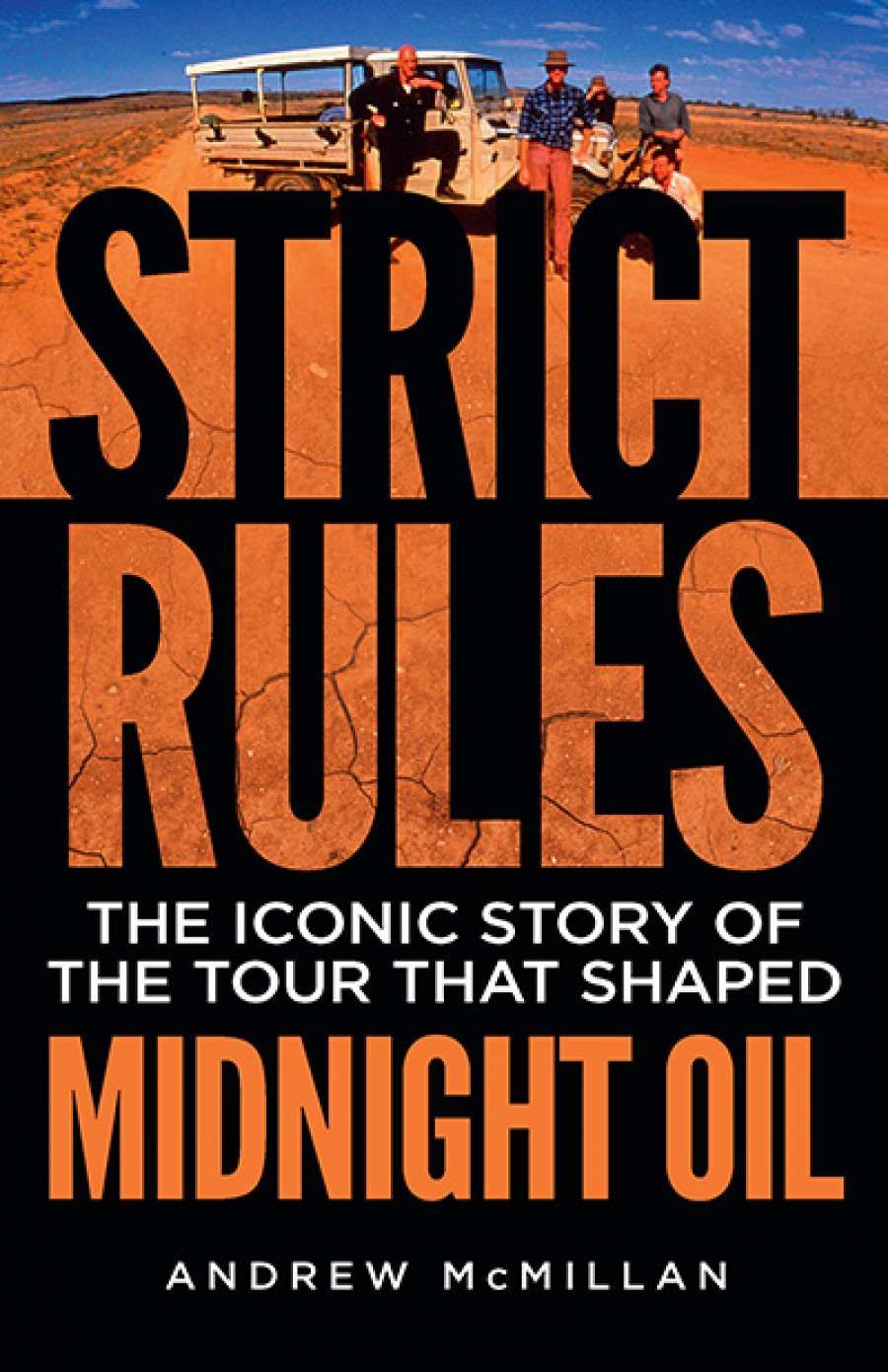
- Free Article: No
- Contents Category: Music
- Custom Article Title: Gareth Hipwell reviews 'Strict Rules: The iconic story of the tour that shaped Midnight Oil' by Andrew McMillan
- Custom Highlight Text:
In July 1986, an ascendant Midnight Oil joined forces with the Northern Territory’s trailblazing, predominantly Indigenous Warumpi Band and embarked on the joint ...
- Book 1 Title: Strict Rules
- Book 1 Subtitle: The iconic story of the tour that shaped Midnight Oil
- Book 1 Biblio: Hachette, $24.99 pb, 320 pp, 9780733638084
The wounds of white atrocities committed against the regions’ Indigenous people are a disquieting background to McMillan’s narrative, as are the many still-pressing problems faced by the Indigenous people he encountered, including chronic inner-ear and kidney disease, entrenched alcohol abuse, and petrol-sniffing. McMillan bears unflinching witness to appalling intergenerational deprivation and disadvantage.
Against such a momentous and chequered backdrop, rock and roll understandably yields top billing to McMillan’s more pressing preoccupations. His take on the sand-rattling business of live performance is, accordingly, somewhat fractured and episodic; gig reviews separated by tranches of historical background and social enquiry. McMillan hews throughout to the roving, queasy-cam style of early influence Hunter S. Thompson to produce a multi-faceted chronicle of the tour. He casts his eye over manifold logistical difficulties – strained relationships and personal antipathies, distance and isolation, cross-cultural suspicions and resentments, and enormities inevitably lost in translation. Traversing country, he surveys traditional lands blighted by strip-mining, weighing ecological degradation against the assurance of self-sufficiency afforded many Indigenous communities by mining royalties.
Strikingly, in McMillan’s telling, a certain distance, both spatial and cultural, obtains between Midnight Oil and Warumpi Band. The divide is bridged most decisively during the bands’ iconic performance at Cooinda, where Midnight Oil famously joined the Warumpi Band onstage to share in the latter’s anthemic ‘Blackfella–Whitefella’, trading instruments before segueing into their own ‘The Dead Heart’.
Save for two performances, McMillan paints the Warumpi Band as a rousing live act at the peak of its powers, led by its electrifying Gumatj Yolngu frontman, the late George Burarrwanga. Midnight Oil, in contrast, encountered markedly varied responses. Performing on improvised outdoor stages and in rec halls alike, we see the Oils triumph in front of wildly receptive crowds one night, before encountering perplexed disengagement the next.
Charged with fresh political fire centred, in greater part, on the plight of Indigenous Australia, seminal Midnight Oil albums Diesel and Dust (1987) and Blue Sky Mining (1990) undeniably bear the stamp of the band’s 1986 experiences. McMillan’s unwavering projection of Garrett as a man of clear conviction, conscience, and charisma makes the latter’s ultimate fate in federal Cabinet a poignant footnote.
 Warumpi Band, 1981 (photograph courtesy of Festival Australia)Perhaps more pronounced than the tour’s influence on Midnight Oil, however, was the impact it had on McMillan himself. McMillan’s prose fairly crackles with the tindery, dry-brittle textures of Western Desert spinifex and mulga in the book’s opening chapters, throughout which he refers to himself, in the third person, as ‘the hitch-hiker’. But, as the tour sweeps northward out of the desert and into the coastal idylls of the Top End, McMillan symbolically dispatches this restless alter ego, signalling his decided attachment to the region that would soon become his adoptive home. As his An Intruder’s Guide to East Arnhem Land (2001) attests, McMillan’s experiences on the Blackfella–Whitefella tour set the course for the rest of his life (he died in 2012). His powers of description in the latter half of the book are formidable, establishing him alongside Xavier Herbert as one of Australian literature’s most vibrant chroniclers of the Tropical North.
Warumpi Band, 1981 (photograph courtesy of Festival Australia)Perhaps more pronounced than the tour’s influence on Midnight Oil, however, was the impact it had on McMillan himself. McMillan’s prose fairly crackles with the tindery, dry-brittle textures of Western Desert spinifex and mulga in the book’s opening chapters, throughout which he refers to himself, in the third person, as ‘the hitch-hiker’. But, as the tour sweeps northward out of the desert and into the coastal idylls of the Top End, McMillan symbolically dispatches this restless alter ego, signalling his decided attachment to the region that would soon become his adoptive home. As his An Intruder’s Guide to East Arnhem Land (2001) attests, McMillan’s experiences on the Blackfella–Whitefella tour set the course for the rest of his life (he died in 2012). His powers of description in the latter half of the book are formidable, establishing him alongside Xavier Herbert as one of Australian literature’s most vibrant chroniclers of the Tropical North.
When the Oils exited the Top End to stage left, the Warumpis returned to the ‘great silence’ of the desert. Their retrospective compilation Warumpi Band 4 Ever (2015), which encompasses, among other things, the band’s three studio albums, still thrills with potent feeling.
This is, of course, our recent past. In his epilogue, Garrett considers several worrying developments in the ensuing decades, including recent political posturing in Western Australia on the issue of ostensibly ‘unsustainable’ remote Indigenous communities. Tellingly, such enduring hope as still chimes in Strict Rules is rooted in McMillan’s reflections on the clear gains won by the return of Indigenous lands to their traditional owners.


Comments powered by CComment